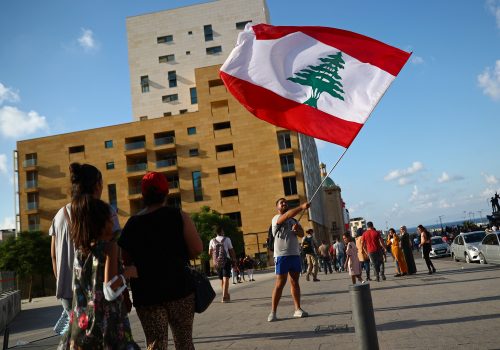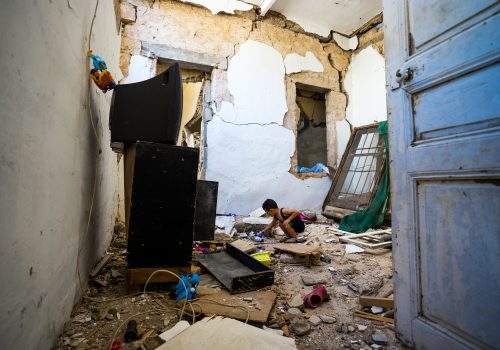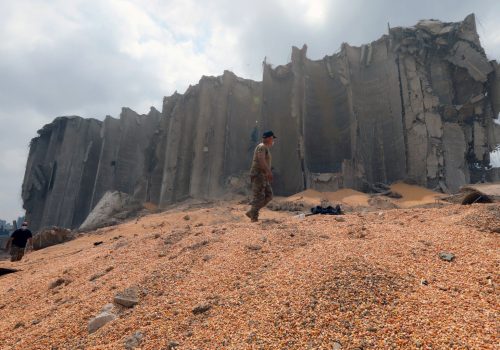Lebanese politicians look for handouts instead of reforms
In his latest speech on August 15, Hassan Nasrallah, the leader of Lebanese militant group Hezbollah, declared that his country is already “amid the collapse.” And, indeed, he might very well be right. Lebanon has fully lifted fuel subsidies, plunging many homes into darkness as many of the country’s residents rely on diesel generators to power their homes. Hospitals are struggling to keep the lights on while flour mills cease operation, spurring fears of a bread shortage. Pharmacies can barely stock medicines while the COVID-19 pandemic continues.
One would think that such a bleak situation would push Lebanese politicians into forming a technocratic government capable of at least passing some reforms to save the country from the brink of collapse. But therein lies the problem: any reforms would rob Lebanon’s sectarian oligarchs of their power. Thus, Lebanese politicians are allowing for Lebanon’s collapse while hoping for as much international aid as possible with as little strings attached.
Since the end of the Lebanese civil war in 1990, there have been large international conferences to help bail out the country from its chronic economic problems. After fifteen years of civil war and conflicts with Israel, this was done in the hopes of keeping Lebanon together, as no one wished to see the country become a regional arena of strife again. In a report published in February by the London School of Economics, it is estimated that the $170 billion in financial assistance given to Lebanon by its various supporters since the end of its fifteen-year civil war is greater than the amount of aid given to countries under the Marshall Plan (adjusted for inflation). Yet, thanks to corruption, much of this money was misspent or stolen, leaving Lebanon heavily indebted and still with poor infrastructure. Even money meant for Syrian and Palestinian refugees in Lebanon has been misappropriated.
But, now, Lebanese politicians are locked in a battle of resolve with the international community over reforms in exchange for aid. So far, western powers have refused to give large sums over to Lebanon until they see the implementation of tangible reforms. The International Monetary Fund (IMF) was willing to offer the Lebanese government $11 billion in 2020 if it proposed and implemented honest reforms. All it received was a sixty-five-page proposal from the government that consisted of Prime Minister Hassan Diab proposing vague reforms that would be funded by money from the Lebanese diaspora. The IMF did not proceed with the bailout. Real reforms, like privatizing state companies or cutting spending, would stop Lebanon’s sectarian oligarchs’ patronage networks and halt their access to state funds. In fact, the World Bank noted in 2020 that the current economic depression in the country is allegedly being carried out deliberately by Lebanon’s political class.
Instead of cooperating, the Lebanese elite has resorted to blackmailing the international community while holding out for funds with little to no strings attached. The head of Lebanon’s largest parliamentary bloc and the son-in-law of the Lebanese president, Gibran Bassil, and former Prime Minister Diab have told the international community that letting Lebanon collapse would mean the unleashing of the over 1.5 million Syrian refugees that reside in Lebanon. As Cyprus and Greece are nearby, this means that the refugees could end up on the European Union’s doorstep—something the West is wary of after the 2015 refugee crisis in which a million refugees—primarily from the Middle East—arrived in Europe. Joseph Aoun, the commander of the Lebanese Armed Forces, has even warned that the army could collapse as its soldiers’ salaries are now only worth $84 a month in local currency, when they were worth $800 just two years ago. These are certainly threats that cannot be taken lightly.
And their strategy is already working. The World Food Programme continues to bolster its program in the country as the World Bank is setting up an emergency fund for Lebanon. Iran, Iraq, and even the US are reportedly sending fuel. On August 4, the one year anniversary of the Beirut port explosion, French President Emmanuel Macron even hosted another donor conference for Lebanon where US President Joe Biden pledged $100 million and France 100 million euros, but with little mention of the necessary reforms that need to be taken in exchange.
Lebanese politicians are already looking at how to exploit incoming foreign aid. The World Bank is willing to give Lebanon emergency aid to stop the population from starving. The Lebanese government has only given a verbal agreement that it will pay out the aid in dollars. Originally, it had intended to give out the aid in Lebanese lira at a rate it would set, allowing politicians to exchange dollars at their own price. This would create a new patronage system in which financial aid to Lebanon would be doled out in different ways by the varying oligarchs.
More concerning are parties like Hezbollah demanding the Finance Ministry be allotted to the Shia sect it dominates. The ministry oversees the national budget, tax collection, public debt, customs, land registry, international payments, liaisons with the Lebanese Central Bank, signs off on funding for major projects and, most importantly, allows disbursement of foreign aid. In fact, any ministry that needs funds for a project must get the finance minister’s signature. With that in mind, Hezbollah wants its hands on the Finance Ministry to control the disbursement of pending international aid and to have a major say in negotiating and implementing any structural reforms, something the party has voiced apprehensions towards. This will allow Hezbollah access to fresh funds as it faces sanctions and will grant Hezbollah the ability to veto any financial reforms it could deem as a threat to the party.
So now we are left with the slow and steady crumbling of the Lebanese state as its politicians hold out for international aid with as few strings attached as possible. But the question now is who will blink first: the international community or Lebanese politicians? And will Lebanon continue to destabilize or will international donors cave in as it watches the population starve?
Paul Gadalla is a former Beirut-based journalist who also worked in communications at the Carnegie Middle East Centre. He has an MA in political science and focuses on the Eastern Mediterranean and religious minorities. Follow him on Twitter: @BoulosinDC.
Image: Barbers shave their customers outside their shop due to a power cut in Beirut, Lebanon, August 20, 2021. Picture taken August 20, 2021. REUTERS/Mohamed Azakir


